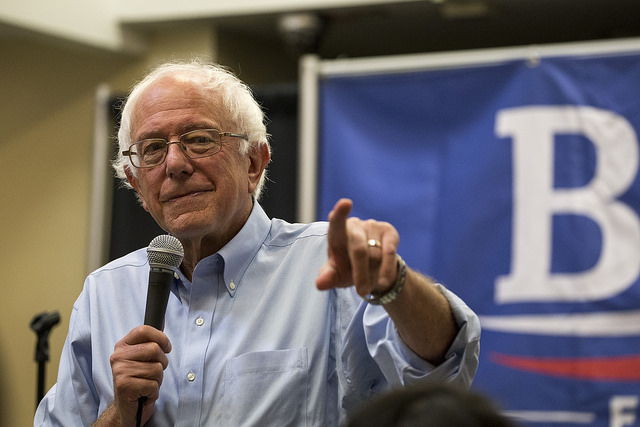Opinion: Bern Baby, Bern
January 8, 2016
At the beginning of the 2016 Presidential race, one woman seemed to loom over the GOP. That, of course, was former secretary of state, Hillary Clinton. While the candidates of the Republican Party duked it out with Clinton, a dark horse arrived hot on the heels of the Democratic poll leader: Bernie Sanders, the independent senator from Vermont, had entered the fray.
“I got into politics not to figure out how to become president. I got into politics because I give a damn,” the presidential candidate tweeted shortly after the most recent democratic debate.
This sentiment perfectly displays the sincerity of his campaign. Agree with him or not, it’s hard to deny that Bernie Sanders genuinely cares about this country we call home. He’s bluntly honest in his ideas and has almost never wavered in these throughout his long voting record. He carries a thick, Brooklyn accent, is unashamed of his Jewish upbringing, and believes that the citizens — not major corporations and banks — should run America. He leads the push for environmental protection, proposed the expansion of Medicare to all Americans, and, above all, supported the destruction of income inequality that plagues our nation.
Bernie dreams of a better tomorrow for all, but are these promises even capable of being fulfilled? That’s what most opponents of Sanders want to know. Somebody has to pay for these programs, and most hard working Americans don’t want to spend their money paying larger taxes. Also the idea of “socialism” just doesn’t resonate soundly with all Americans. America was founded as a land of the free, where the idea of sharing wealth is seen as virtuous but never forced.
But even if you think Sander’s socialist policies will never work, you should still pay attention to him.
And here’s why:
Bernie Sanders represents an atypical type of candidate. Most political campaigns these days are run by super PACs. The wealthy are able to shape America how they see fit because they can fund the campaigns of the politicians of their choosing. They can pay for the most advertising and everyone knows that whoever controls the media, controls the race. These committees are often seen as shady organizations that strong-arm the individual American with the power of wealth. For many candidates, this was accepted as the way you became president; but for a man with Sanders prestige, this was simply not an acceptable route. Sanders has received nearly 2.3 million donations, a feat that no other presidential candidate in the history of the nation has accomplished. Clearly, his voice resonates among the people.
In a perfect society, most of what Sanders pushes for would exist. He’s a man for the people, and knows how to give them what they want. You might say, “He would violate the rights of the upper and upper-middle class! It’s anti-freedom! It’s anti-American!” While you can make that argument, that doesn’t necessarily make him wrong. Even if he doesn’t become president, the messages he sends can help Americans become more aware of the social justice issues the country faces.
The most lasting effect of Senator Sanders’ campaign may be that he furthers the polarization of American politics. Over the past two decades, we’ve seen more and more politicians who are consistently conservative or liberal. And as far as liberal politics go, Sanders is about as consistent as you can get. As he pulls more and more support from the public, the party as a whole is shifted more to the left. Will this force Hillary to fall into a more liberal view than she already had? Some say it already has.
But at the end of the day, everyone is feeling the Bern.




